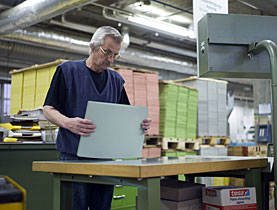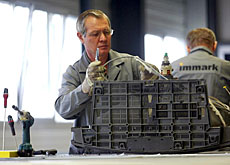Older workers belie stereotypes

A higher proportion of older people are employed in Switzerland than anywhere else in Europe.
A report suggests that this is quite justified. It found that although younger workers have the reputation of being more efficient, dynamic and flexible, older workers still have plenty to offer.
The proportion of Swiss people aged between 55 and 64 years in some form of employment has risen from 63.5 per cent to 68.4 per cent in the last 12 years. This compares to a European Union average of 44.7 per cent in 2007.
But there’s a big difference between being employed and finding a new job. There is evidence to suggest that some companies would rather hire younger employees from abroad than turn to Swiss workers aged over 50.
The study by the Lucerne University of Applied Sciences and Arts suggests that filling jobs with younger people is not necessarily the best move. It examined the efficiency of workers of different age groups.
“The differences in efficiency are larger within the same age groups than between these groups,” study author, Colette Peter, told swissinfo. Older workers may be less able to perform tough physical tasks, but they can make up for this with experience and superior judgement skills, the report found.
Migrant workers
The recent opening of Swiss borders to EU workers means that the issue is no longer just confined to Switzerland. And Peter does not believe that Switzerland’s high percentage of over-55s in work is necessarily a triumph of personnel policy.
“We must be conscious that in the next few years competition in individual countries will increase because of the aging society,” she said. The solution does not lie with importing migrant workers, but by improving education and training, the employment expert added.
“Many youngsters with a migrant background remain disadvantaged in the job market. It requires further investment to get these people qualified to work,” Peter said. “Older workers also need more and better incentives.”
The ageing workforce has been forecast for decades and yet little appears to have been done to prepare for it. Peter believes the issue has been over-ridden with the need to solve short-term problems with the Swiss economy.
“There is already a lack of skilled workers in some sections of the economy. These have been partly filled by German immigrants. [But] the economy will probably have to have a rethink,” she said.
Firms begin to react
However, some larger companies have begun to address the issue, according to Peter. Technology group ABB, which is active all over the world, does more than pay lip service to the over-45 generation.
“Approximately 10 per cent of all new employees in 2008 were 50 years old or older,” ABB Switzerland personnel chief Renato Merz told swissinfo.
Companies would probably only start to react if they could not fill job vacancies any other way, Peter believes. “We saw this with the integration of women into the workplace. Child care and the like were only introduced when women became indispensable,” she said.
“We can do very little at present other than press our message home. When people are confronted with the facts they can leave their prejudices and stereotypes behind.”
Alexander Künzle, swissinfo.ch (translated from German by Matthew Allen)
The Swiss population is expected to peak at 8.2 million in 2036 before falling to 8.1 in 2050, according to a 2006 Federal Statistics Office projection.
The number of people aged 65 and over will increase by 90% in the same period to 2.2 million people – or 27% of the population.
A study by the think tank Avenir Suisse, published in 2006, found 70% of more than 800 firms surveyed had provisions in place to keep older employees.
Measures included introducing part-time work, making job descriptions more flexible and allowing sabbaticals.
Switzerland has more 55-64 year olds working per head of the population than any other industrialised country, according to 2003 figures:
Switzerland: 70%, Japan: 63%, US: 55% and Belgium: 27%

In compliance with the JTI standards
More: SWI swissinfo.ch certified by the Journalism Trust Initiative












You can find an overview of ongoing debates with our journalists here . Please join us!
If you want to start a conversation about a topic raised in this article or want to report factual errors, email us at english@swissinfo.ch.